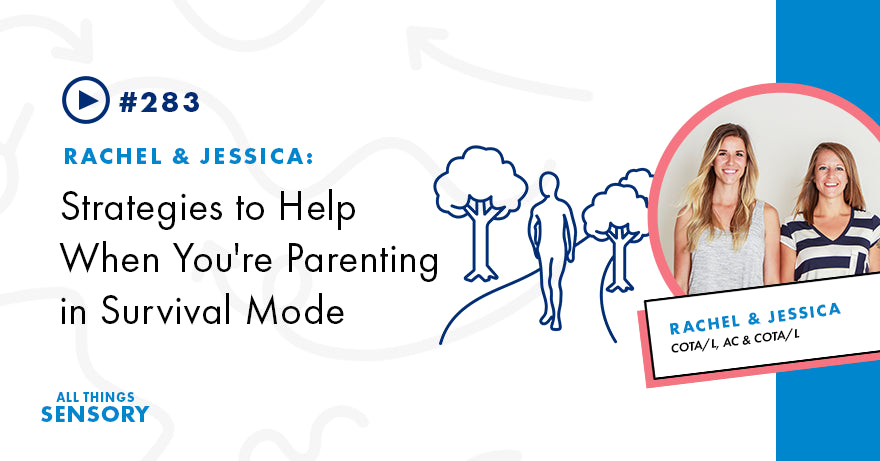Your Cart is Empty

Check out our Holiday Sensory Survival Guide, on sale NOW!
Shop During the Harkla Holiday Sale and Save 20% on ANY Order!
Nov. 20-27, 2023
Shop here - https://harkla.co/pages/holiday-sale
This episode is all about parenting while in survival mode. If you’re a parent who feels like every day is a struggle, or if you’re a professional working with families, this episode is for you!
Listen in as we discuss practical tips and techniques for preserving your sanity during demanding times. Discover effective ways to prioritize self-care, find support networks, and seek help when needed.
Through this episode, we hope to inspire and uplift parents who may be struggling with their own survival mode. Find solace in the fact that you're not alone, and that there is a community of parents who understand and empathize with your journey.
Make sure to check out all of our links below!
We’d love to answer your questions on the podcast! Fill out this form -> https://harkla.typeform.com/to/ItWxQNP3
All Things Sensory Podcast Instagram
Harkla Website - Shop Sensory Products!
The Overstimulated Parent’s Guide
Parenting is a demanding journey, and there are times when you may feel like you're constantly in survival mode, just trying to make it through each day. This state of mind can be overwhelming, but there are practical strategies you can implement to help regain control and create a more balanced life for yourself and your children.
You can regain control by building habits around simple activities like walking, drinking more water, opening windows for fresh air, taking movement breaks, and tidying up. These small actions may seem minor, but they contribute to a structured and predictable environment that can help reduce feelings of chaos and overwhelm.
Whether you struggle with sensory issues, ADHD, or other personal difficulties, understanding these challenges can help you find effective strategies to manage them.
Hydration: Use a fun water bottle, set reminders on your phone to drink water regularly, and consider adding electrolytes.
Sleep: Prioritize getting enough rest, even if it means going to bed earlier. If you struggle with sleep due to your children's needs, try to find small opportunities to rest throughout the day.
Nutrition: Focus on whole foods and prioritize protein at every meal. If you suspect nutritional deficiencies, consider consulting with a functional medicine practitioner.
Physical activity and play are vital for your and your children's well-being. Incorporate activities that get you moving and bring joy, such as:
A cluttered and chaotic environment can contribute to feelings of overwhelm. Regularly tidy up your space to create a more organized and calming atmosphere.
Consider these strategies:
Taking care of yourself is not selfish; it's necessary. Here are some self-care strategies:
Some changes require more time and effort but can have a significant impact on your well-being, such as:
Parenting in survival mode is challenging, but by implementing these strategies, you can regain control and start to thrive. Remember, taking small steps and being kind to yourself is essential.
Choose one or two strategies to focus on initially and gradually build from there. You are not alone, and with the right tools and support, you can create a more balanced and fulfilling life for yourself and your family.
BORING, BUT NECESSARY LEGAL DISCLAIMERS
While we make every effort to share correct information, we are still learning. We will double check all of our facts but realize that medicine is a constantly changing science and art. One doctor / therapist may have a different way of doing things from another. We are simply presenting our views and opinions on how to address common sensory challenges, health related difficulties and what we have found to be beneficial that will be as evidenced based as possible. By listening to this podcast, you agree not to use this podcast as medical advice to treat any medical condition in either yourself or your children. Consult your child’s pediatrician/ therapist for any medical issues that he or she may be having. This entire disclaimer also applies to any guests or contributors to the podcast. Under no circumstances shall Rachel Harrington, Harkla, Jessica Hill, or any guests or contributors to the podcast, as well as any employees, associates, or affiliates of Harkla, be responsible for damages arising from use of the podcast.
Keep in mind that we may receive commissions when you click our links and make purchases. However, this does not impact our reviews and comparisons. We try our best to keep things fair and balanced, in order to help you make the best choice for you.
This podcast should not be used in any legal capacity whatsoever, including but not limited to establishing “standard of care” in a legal sense or as a basis for expert witness testimony. No guarantee is given regarding the accuracy of any statements or opinions made on the podcast.
Comments will be approved before showing up.